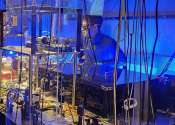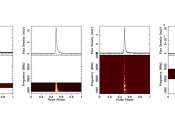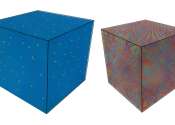
Two shark species documented in Puget Sound for first time
Oregon State University researchers have made the first scientific confirmation in Puget Sound of two distinct shark species, one of them critically endangered.
Oregon State University researchers have made the first scientific confirmation in Puget Sound of two distinct shark species, one of them critically endangered.
Plants & Animals
Jul 27, 2024
1
235

Experiments reveal that image memorability can sharpen our sense of time
Research by George Mason professor Martin Wiener recently demonstrated that the more memorable an image is, the longer and more accurately its viewers can perceive the passage of time. ...
Research by George Mason professor Martin Wiener recently demonstrated that the more memorable an image is, the longer and more accurately its viewers ...
Social Sciences
Jul 27, 2024
0
73

Saturday Citations: E-bike accident spike; epigenetics in memory formation; Komodo dragons now scarier
This week, we reported on new epigenetic findings in memory formation as well as a dramatic spike in micromobility-related head injuries, so there's a whole lot of head-related science ...
This week, we reported on new epigenetic findings in memory formation as well as a dramatic spike in micromobility-related head injuries, so there's a ...

Spacecraft to swing by Earth, moon on path to Jupiter
A spacecraft launched last year will slingshot back around Earth and the moon next month in a high-stakes, world-first maneuver as it pinballs its way through the solar system to Jupiter.
Space Exploration
Jul 27, 2024
0
34

New process uses light and enzymes to create greener chemicals
Researchers at the Center for Advanced Bioenergy and Bioproducts Innovation (CABBI) have achieved a significant breakthrough that could lead to better—and greener—agricultural chemicals and everyday products.
Materials Science
Jul 27, 2024
0
77

Outsourcing conservation in Africa: NGO management reduces poaching and boosts tourism, but raises risks for civilians
There's an experiment going on in conservation in Africa. With biodiversity imperiled, and nations facing financial and political crises, some governments are transferring the management of protected areas to private, non-governmental ...
Ecology
Jul 27, 2024
0
21

Exploring what happens when different spherical objects hit the water
When an object hits a body of water vertically, it is accompanied by a strong hydrodynamic force fueled by the flow of water around it, which propels it forward. The magnitude of this force is known to vary depending on the ...

New study disputes Hunga Tonga volcano's role in 2023–24 global warm-up
New research from a collaborative team featuring Texas A&M University atmospheric scientist Dr. Andrew Dessler is exploring the climate impact of the 2022 Hunga Tonga volcano eruption and challenging existing assumptions ...
Earth Sciences
Jul 26, 2024
2
511

Communicating numbers boosts trust in climate change science, research suggests
The intuition to distill hard numbers like "90 percent" into words like "almost all" may help make science and statistics more accessible, but new research shows that isn't necessarily the best way to engage people online.
Education
Jul 26, 2024
2
116

Physicists introduce method for mechanical detection of individual nuclear decays
In recent years, physicists and engineers have developed increasingly sophisticated instruments to study particles and the interactions between them with high precision. These instruments, which include particle detectors, ...

Study identifies biomarker that could predict whether colon cancer patients benefit from chemotherapy
Many people with stage II or III colon cancer receive additional, or adjuvant, chemotherapy following surgery. However, clinical trials have shown that this treatment doesn't improve the chances of survival for every patient. ...
Oncology & Cancer
Jul 27, 2024
0
68

The Future is Interdisciplinary
Find out how ACS can accelerate your research to keep up with the discoveries that are pushing us into science’s next frontier
 Medical Xpress
Medical Xpress

Q&A: How a stem cell bank is helping scientists understand psychiatric disorders

New study shows 'dancing molecules' can regenerate cartilage in 3 days

BRCA1/2: Why men should be screened for the 'breast cancer gene'

'Prelude' to neuromuscular disease spinal muscular atrophy may offer chances for better treatment

Researchers move a step closer to developing at-home test to detect dementia
 Tech Xplore
Tech Xplore

Study explores win–win potential of grass-powered energy production

Memristive radiofrequency switches show improved performance for mmWave applications

Using AI to train AI: Model collapse could be coming for LLMs, say researchers

Scientists' innovation for indoor solar cells maximizes the use of light energy

Study sheds more light on the nature of pulsar PSR J1227−6208
Astronomers from the Max Planck Institute for Radio Astronomy (MPIfRA) in Bonn, Germany and elsewhere have inspected a recycled pulsar known as PSR J1227−6208. The new study, published July 18 on the preprint server arXiv, ...

Central nervous system-associated macrophages could modulate post-stroke immune responses
An ischemic stroke is a type of stroke that occurs when a blood clot in an artery, also known as thrombus, or the progressive narrowing of arteries, blocks the blood and oxygen flowing to the brain. This process can cause ...

New study shows 'dancing molecules' can regenerate cartilage in 3 days
In November 2021, Northwestern University researchers introduced an injectable new therapy, which harnessed fast-moving "dancing molecules," to repair tissues and reverse paralysis after severe spinal cord injuries.
Biomedical technology
Jul 26, 2024
0
151

Twisted carbon nanotubes could achieve significantly better energy storage than advanced lithium-ion batteries
An international team of scientists, including two researchers who now work in the Center for Advanced Sensor Technology (CAST) at UMBC, has shown that twisted carbon nanotubes can store three times more energy per unit mass ...
Nanomaterials
Jul 26, 2024
0
362

New clam species discovered in South Africa's kelp forest
A new study sheds light on the unexplored diversity of galeommatoidean bivalves, a little-known group of marine mollusks, from the western coast of South Africa.
Plants & Animals
Jul 26, 2024
0
366

Experts warn against hype for deriving green hydrogen from direct seawater electrolysis
At first glance, the plan sounds compelling: invent and develop future electrolyzers capable of producing hydrogen directly from unpurified seawater. But a closer look reveals that such direct seawater electrolyzers would ...
Energy & Green Tech
Jul 26, 2024
0
90

Invasive, blood-sucking fish 'may hold the key to understanding where we came from,' say biologists
One of just two vertebrates without a jaw, sea lampreys that are wreaking havoc in Midwestern fisheries are simultaneously helping scientists understand the origins of two important stem cells that drove the evolution of ...
Plants & Animals
Jul 26, 2024
0
17

New self-powered electrostatic tweezer enhances object manipulation and microfluidics
In a study published in Device has reported a new self-powered electrostatic tweezer that offers superior accumulation and tunability of triboelectric charges, enabling unprecedented flexibility and adaptability for manipulating ...
Soft Matter
Jul 26, 2024
0
61

Climate is most important factor in where mammals choose to live, study finds
While human activity has had a massive effect on the natural world, a new study from North Carolina State University finds that climate is still the most influential factor in determining where mammals can thrive. The work ...
Plants & Animals
Jul 26, 2024
0
55

Raman spectroscopy offers new insights into ionic liquid acidity
Researchers at the University of Liège have for the first time determined the acidity of ionic liquids using Raman spectroscopy, thanks to Hammett acidity functions. This advance promises to revolutionize our understanding ...
Analytical Chemistry
Jul 26, 2024
0
83

AI-powered weather and climate models are set to change the future of forecasting, researchers say
A new system for forecasting weather and predicting future climate uses artificial intelligence (AI) to achieve results comparable with the best existing models while using much less computer power, according to its creators.

Hubble images NGC 3430, a classic spiral galaxy
This NASA/ESA Hubble Space Telescope image treats viewers to a wonderfully detailed snapshot of the spiral galaxy NGC 3430 that lies 100 million light-years from Earth in the constellation Leo Minor.

Bearded fireworm stalks shallows as Mediterranean warms
The fish in Alfonso Barone's net are hauled aboard off Sicily half- eaten, ravaged by bearded fireworms, a voracious predator flourishing in the increasingly warm Mediterranean sea.

Endangered gazelles find Libyan 'safe haven'
Cocooned in white bags and nestled in the arms of volunteers, eight young rhim gazelles—an endangered species native to North Africa—have been transferred to an uninhabited Libyan island.

California fire rapidly reaches state's top 10 biggest ever
A fire raging out of control in northern California has rapidly become among the biggest ever in the western US state, authorities said Saturday.

Ghosts of species past: Shedding new light on the demise of NZ's moa can help other flightless birds
New Zealand was once home to giant flightless birds called moa. They had grown accustomed to life without predators. So the arrival of humans in the mid-13th century presented a massive—and ultimately insurmountable—challenge ...

Komodo dragons have iron-coated teeth to rip apart their prey, researchers find
Scientists have discovered that the serrated edges of Komodo dragons' teeth are tipped with iron. Led by researchers from King's College London, the study gives new insight into how Komodo dragons keep their teeth razor-sharp ...

Fossil algae show a lake once existed on Lesotho's Mafadi summit, but it vanished about 150 years ago
Lesotho is a small, land-locked, mountainous country located in the middle of South Africa. Its Eastern Lesotho Highlands are often referred to as the region's "water tower" because they receive some of the highest rainfall ...

NASA Mars rover captures rock that could hold fossilized microbes
NASA's Perseverance Mars rover has made what could be its most astonishing discovery to date: possible signs of ancient life on the Red Planet.

Philippine coast guard says oil leaking from sunken tanker
Some of the 1.4 million liters of industrial fuel oil inside a sunken Philippine tanker has started to leak into Manila Bay, the coast guard said Saturday, as they raced to avoid an environmental catastrophe.

Thousands evacuate season's biggest wildfire in northern California
A huge, fast-moving and rapidly growing wildfire in northern California has forced more than 4,000 people to evacuate as firefighters battle gusty winds and perilously dry conditions, authorities said Friday.

Developing a nano-treatment to help save mangroves from deadly disease
Mangroves and palm trees are hallmarks of the Sunshine State not just for their beauty but for their immense importance to Florida's coastlines.

Exploring cadmium-induced alterations in the expression profile of microRNAs
Cadmium (Cd), a toxic heavy metal, has been identified as a significant environmental pollutant due to its widespread industrial use and persistence in the environment. Chronic exposure to Cd poses a considerable threat to ...

New aerospace and building materials could repair themselves thanks to fungi and bacteria
Researchers are using biological matter to create unique new materials that can adapt to their environment and repair themselves.

Exploring the effects of initial microbiota on microbial succession during eggplant fermentation
Shibazuke is a traditional Japanese eggplant pickle produced by the process of fermentation using lactic acid bacteria (LAB). LAB which are commonly present in vegetables cause the spontaneous fermentation of vegetables, ...

What's really behind the ad label? The dark arts influencers are using to get your likes
Rogue social media influencers are relying on gender stereotypes, bogus claims and deceptive editing to monetize their content and increase their following, a new study has found.

Study warns of rise of 'new chauvinism' fueled by right-wing populism
New research from the University of Bath has identified a "new chauvinism," fueled by a resurgence in right-wing populism, and distinguished by the use of softer, more subtle language than traditional chauvinism.

New research on legal aid cuts shows wasted money and 'embarrassing' data gaps in UK
There needs to be "significant improvements" to the way data is collected across UK Government to prove if major changes to legal aid have delivered value for money to the taxpayer, a new report says.

Surveys reveal vast mangrove damage along Great Barrier Reef and restoration hotspots
A James Cook University report has revealed severe damage in about 80% of mangroves along the Great Barrier Reef, from Cairns to Gladstone—and pinpointed 52 potential restoration hotspots over 17,255 hectares.

AI makes useless noise widely useful in synchronizing physical oscillators
In a Letter published in Physical Review E, scientists from the Research Institute of Intelligent Complex Systems (IICS) at the Fudan University show AI makes useless noise widely useful in oscillator synchronization. These ...











































































